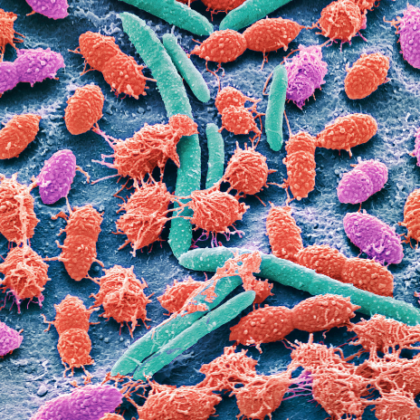Omega-3 Supplements and Autism: A Closer Look at the Evidence
The Paper of the Month for March is ‘Impact of omega-3 fatty acid supplementation on clinical manifestations in autism spectrum disorders: an umbrella review of meta-analyses“.…

The Paper of the Month for March is ‘Impact of omega-3 fatty acid supplementation on clinical manifestations in autism spectrum disorders: an umbrella review of meta-analyses“.…

Fast-food - it’s quick, convenient, and hyper-palatable. Part of its palatability comes from the generous amounts of added sodium [dietary salt]. For example, a hamburger with fries can easily provide more than a person’s daily upper limit for sodium of 2,000mg. Unfortunately, too much sodium is linked to high blood pressure which is associated with cardiovascular disease, the leading cause of preventable death in Aotearoa, New Zealand (NZ) and globally, and sales data shows our appetite for fast-food is increasing.

Optimal growth of the human fetus and the newborn infant is associated with better health and neurodevelopment in infancy and also the benefits of early growth persist into adult life and during aging.

When a mother breastfeeds her baby, she supports both the development of her child and the microbes in the child’s gut. Breast milk contains unique carbohydrates called human milk oligosaccharides (HMOs) that cannot be digested by the baby. Instead, these HMOs reach the gut to be used by the gut microbes. Bifidobacteria, among other gut microbes, help degrade HMOs and produce beneficial product in the baby’s gut.

The way we respond to the various constituents of our diet may differ depending on whether we are males or females. Given that females have been largely underrepresented in such research to date, aspects of the diet we believe to be beneficial or deleterious may not hold true for half of the population. These so called ‘sex differences’ relating to diet are further complicated by the ageing process. For example, reproductive ageing in females leads to the menopausal transition, altering the hormone profile and key processes such as metabolism. As such it is important as nutritional researchers that we comprehend how components of our diet are influenced by sex across the lifespan.

When we think of malnutrition, we often picture individuals who are underweight or experiencing hunger, struggling with inadequate levels of essential nutrients. However, malnutrition can also exist in individuals with obesity. Many people in this population may have a relatively low intake of essential nutrients, especially during illness, leading to physiological changes often overlooked in clinical assessments. Identifying protein-energy malnutrition in individuals with obesity is challenging due to distinctive physical and physiological characteristics, including increased body weight, adipose tissue dysfunction and metabolic dysregulation presented as systemic inflammation.

Childhood obesity is a growing concern and is driven in part by widespread exposure to unhealthy food marketing. Various policies could help to reduce this exposure, targeting specific products, settings and marketing mediums, such as TV and outdoor signs.

Pulses, including dry beans, chickpeas and lentils, are healthy, sustainable, and low cost. Pulses, however, are not currently consumed as frequently or by as many people as is currently recommended for health benefits or for planetary gain. We sought to understand why this was, what could be done to encourage pulse consumption, and whether cooking suggestions and recipes can help.

Catch-up growth, i.e., accelerated gain in weight and length to attain a size in accordance with genetic potential is a common phenomenon in infants who are born at full term with low birth weight (mostly as a consequence of intrauterine growth restriction). Previous studies have indicated that rapid growth during infancy may be associated with greater adiposity and adverse metabolic consequences in later life.

Most of the evidence linking diet with complex diseases such as heart disease and cancer (non-communicable diseases (NCD)) is based on findings from epidemiological cohort studies which follow large populations of people to determine whether groups of people who have been diagnosed with or died from the disease, have diets that differ from those who are free from the disease. A limiting factor in these studies is their observational nature which limits the certainty about causal relationships between the exposure (diet) and the outcome (NCDs). Randomised controlled trials (RCTs), where a dietary factor is fed under carefully controlled circumstances, have a greater ability to prove the dietary factor is causing the disease and provide confidence for policymaking.

There are numerous essential vitamins and minerals that play crucial roles in maintaining our health and wellbeing. Among these, selenium stands out as a lesser known yet exceedingly important micronutrient.

In a world increasingly concerned with both health and environmental sustainability, the way we eat plays a critical role. However, in our search for solutions for better health and a sustainable planet, we often find ourselves at a crossroads where the decisions we make can have significant trade-offs. This delicate balance between promoting human health and minimizing environmental impact is a central challenge of our time, one that requires careful consideration and informed choices. In our research we investigated whether policies such as food taxes can help the consumer make more healthy and sustainable food choices.

There is a Chinese proverb that says, "It's hard to buy old people being thin with money." We previously thought that for older people, thinness is a sign of health. However, scientific research shows that this view is incorrect.

Today it is well established that our physical wellbeing partially depends on the trillions of microbes in our gut, the intestinal microbiome. At same time, there is emerging evidence that these unicellular lifeforms can also influence our mental status and cognitive performance.

Fatigue is a symptom resulting from the weakening or depletion of one's physical and/or mental resources, ranging from a general state of lethargy to a specific, work-induced burning sensation within one's muscles. It is a highly prevalent feeling but still remains an often-neglected unmet clinical need.

Today’s food systems in high-income countries face several challenges, including a lack of resiliency, resulting in an inconsistent food supply and changing food prices, especially during crises. When faced with this type of challenge, high-income countries tend to rely on short term food relief that doesn’t always meet people’s nutritional needs or choices. In addition, limited access to nutrition education and cooking skills programs makes it hard for those most at risk to use what food they do have effectively. To address these challenges, a focus on local or regional food systems is considered one way to boost food system resilience.

What we eat is influenced by a myriad of external factors: our mood, the occasion, friends and family, new food trends, the location, food presentation, to name only a few. We tend to choose our food differently at a wedding reception surrounded by people we are meeting for the first time than at a garden BBQ with family and friends after a rough day at work.

Dogs may be our best friends, but cats have a plan to challenge that notion! They need our help to thrive, and it starts with good food.

The Paper of the Month for July is ‘Prospective association between adherence to UK dietary guidelines in school-age children and cardiometabolic risk markers in adolescence/early adulthood in the Avon Longitudinal Study of Parents and Children (ALSPAC) cohort'.

The Paper of the Month for May is ‘Microbial gut dysbiosis induced by xenobiotics in model organisms and the relevance of experimental criteria: a minireview'. The blog is written by the below authors and the paper is published in the Gut Microbiome, and is free to access for one month.

With the ongoing global epidemic of obesity and increasing prevalence of dementia, evaluating the impact of over-eating and different diets on brain structure and function becomes increasingly important. Recent studies suggest that the gut microbiota and metabolic changes can impact with cognitive health. In this paper of the month, we were interested in the impact of obesity and diet on the gut-brain axis.

In many low- and lower-middle-income countries, particularly in Sub-Saharan Africa (SSA), where mixed crop-livestock farming is widely practiced, livestock keeping provides income, food, nutrition and other benefits for the rural poor. The nutritional benefits of livestock keeping are particularly important since malnutrition continues to cause nearly half of annual global child deaths, and can have lasting effects on the physical growth and cognitive development of millions of surviving children.

Ready meals are a popular choice in the UK, and it is estimated that almost 90% of us eat them. Many ready meals can be classified as ultra-processed foods, which often have multiple added ingredients such as sugar, salt, fat, artificial colours, or preservatives, and consumption of ready meals has been associated with an increased risk of obesity. However, the jury is still out on the nutritional quality of ready meals.

The Paper of the Month for February is 'Assessing the effects of alternative plant-based meats v. animal meats on biomarkers of inflammation: a secondary analysis of the SWAP-MEAT randomized crossover trial' and the blog is written by author Anthony Crimarco, Ph.D. and is published by the Journal of Nutritional Science and is free to access for one month.

Excess body weight and alcohol consumption are both modifiable risk factors for many adverse health outcomes, including cancer. Alcohol is classified as Group 1 carcinogen by the International Agency for Research on Cancer (IARC), and alcohol consumption is associated with a higher incidence of seven cancer types. Excess body weight is also associated with at least 13 cancer types. Although these factors have been known to be linked with cancer for many years, very few studies have investigated the joint association between alcohol consumption and excess body weight with cancer risk.

The development of ready-to-use therapeutic food (RUTF) and the advent of the community-based management of acute malnutrition (CMAM) model of care revolutionized the management of severe acute malnutrition in children living in low- and middle-income countries. In addition to improved recovery rates and decreased mortality rates, the CMAM model democratized care for children in remote settings by bringing care to the village and household level. This approach has been further expanded to include children with moderate acute malnutrition as well. Scaling up coverage of care and optimizing treatment protocols remain high on the global nutrition agenda.

Nutrition researchers and public health practitioners have become increasingly focused on structural racism following protests against racial injustice in 2020 and the disparities in covid-19 mortality experienced by marginalized groups. Structural racism consists of overlapping systems of discrimination in society such as in policing, housing, and employment. These systems also affect marginalized groups’ ability to access healthful food. For example, African Americans are more likely to live in areas with higher densities of fast-food restaurants and may not have access to full-service grocery stores. Differences in financial resources may also impact their ability to pay for healthy food. Providing nutrition education alone can be insensitive in the face of these obstacles.

There is evidence that the consumption of commercial food products for children is highly prevalent in the world, surpassing the consumption of homemade food in some situations. While such products may have practical advantages, such as time saving in food preparation, there are concerns about nutrient composition.

We need to act now to limit increasing global temperatures by reducing greenhouse gas emissions to meet global targets set out in the Paris Agreement. Among other things, this means changing our diets and reducing our consumption of meat and dairy since livestock production has the highest environmental impact in the food system. Hence, the need to transition away from diets high in animal products to more plant-based diets.

It is curious that many animal experiments have been ignored, which described blood vessel pathology when vitamin D was fed in amounts that didn’t cause any apparent toxicity.

Evidence from human studies has highlighted the role a healthy diet can play in preventing chronic diseases. To help individuals make healthier nutrition choices, professional organizations and scientific societies have published food-based dietary guidelines.

Iodine is an essential micronutrient for humans throughout life due to its need for the production of the thyroid hormones.

Together with a friend, you decide to lose weight by changing your diet. Unfortunately, only your friend is successful in reaching their goal weight. While there can be many reasons for your lack of success, one reason might be hidden in your gut.

The Paper of the Month for April is ‘Dietary protein requirements and recommendations for healthy older adults: a critical narrative review of the scientific evidence‘ and the blog is written by author Lars Holm, Yusuke Nishimura, Grith Højfeldt, Leigh Breen and Inge Tetens published by Nutrition Research Reviews and is free to access for 1 month.…

Anemia or low hemoglobin concentration in the blood is a serious public health problem, affecting one-fourth of the global population. Children under five years of age carry the highest toll of this burden. Approximately 145 thousand children die per year worldwide due to nutritional deficiencies including iron-deficiency anemia. Therefore, wiping out of anemia can save avoidable child deaths.

The last 20 years have seen the development of various numerical means of analysing compositional data based on log-ratio transformations. These have their roots in the seminal work of John Aitchison in the 1980s, primarily applied to the geological field.

Folate, also known as vitamin B9, is found naturally in a wide range of foods such as dark green leafy vegetables, beans, citrus fruits, nuts, eggs, liver, and seafood. The synthetic form of this vitamin, folic acid, is used in supplements and to fortify staple foods including flour.

The health impacts of eating too many ultra-processed foods are well known. Not only are ultra-processed foods high in sugar, salt, and fats, they have other chemicals and properties that contribute to poor health outcomes. Despite this, most dietary guidelines from across the world do not discuss the harms of ultra-processed foods.

After a long, hard day - taking care of the kids, going to work or school, keeping up the house - would you rather sit down for a snack or to a large, satisfying meal? When we eat, our bodies receive necessary fuel, but food does more than provide nutrients. Food is a natural reward that makes us feel good, and there is a greater variety of foods available now than ever before. However, stress from day-to-day life and internal stressors interact with what we choose to eat. Within this context, we can explore how acute or chronic stress alter food intake behaviours that may contribute to the increasing prevalence of obesity worldwide.

The Paper of the Month for October is ‘Potato consumption is not associated with elevated cardiometabolic risk in adolescent girls‘ from the British Journal of Nutrition and is free to access for 1 month.…

The Paper of the Month for September is ‘Monitoring food digestion with magnetic resonance techniques‘ from the Proceedings of Nutrition Society and is free to access for 1 month.…

Ultra-processed foods are industrial formulations of processed food substances (like oils, fats, sugars, starch, protein isolates) that contain little or no whole food and typically include flavorings, colorings, emulsifiers and other cosmetic additives. These characteristics in addition to their low-cost, convenience and aggressive marketing make them very appealing to eat. Almost irresistible.

Maria is a smallholder farmer in rural Singida, Tanzania. We worked together for the past few years on the Singida Nutrition and Agroecology Project (SNAP-Tz), a nutrition-sensitive agroecological intervention that sought to improve children’s diet. In it, farmers learned about and experimented with sustainable agriculture, nutrition, and gender equity using an integrated and participatory curriculum

Fast-food is sold in restaurants and snack bars as a quick meal or to be taken out, and often consists of low-nutrient and energy-dense foods. Consequently, fast-food consumers tend to have higher intakes of energy, fat, saturated fatty acids, trans fatty acids, sugar and sodium, as well as lower intakes of fibre, macronutrients and vitamins. This means that regular fast-food consumers have a higher risk of multiple physical and mental health complications. Worryingly, among adolescents the consumption of fast food is on the rise across the globe.

The challenges in improving nations’ diets persist. As we try to overcome these, an area that is gaining traction is nudging. But can nudge-based interventions change food choice, and enable better decisions when it comes to choosing what to eat? And actually, how effective are they in real-world settings?

The Paper of the Month for April is ‘The Role of Dietary Nitrate and the Oral Microbiome on Blood Pressure and Vascular tone’ and is free to access for 1 month.…

The Paper of the Month for March 2021 is ‘Diet quality improvement and 30-year population health and economic outcomes: a microsimulation study’ from Public Health Nutrition and is free to access for 1 month.…

The Paper of the Month for February 2021 is ‘Is ergothioneine a ‘longevity vitamin’ limited in the American diet?‘ from the Journal of Nutritional Science and is free to access for 1 month..…

The Paper of the Month for January 2021 is ‘Prevalence Of Malnutrition In Covid-19 Inpatients: The Nutricov Study’ from the British Journal of Nutrition and is free to access for 1 month.…

The Paper of the Month for December is Poor appetite and overeating reported by adults in Australia during the coronavirus-19 disease pandemic: a population-based study and is free to access for 1 month.…

The Nutrition Society Paper of the Month for November is ‘Trimethylamine N-oxide: heart of the microbiota–CVD nexus?’ and is free to access.…

October’s Paper of the Month is from the British Journal of Nutrition ‘Assessment of the World Food Programme Summer Camps in Lebanon: a model of effective interventions for vulnerable adolescents’ and is free to access.…

September’s Paper of the Month is from the Journal of Nutritional Science ‘COVID-19: the older adult and the importance of vitamin D sufficiency’ and is free to access.…

August’s Paper of the Month is from Public Health Nutrition ‘Changes in nutrition content and health claims post-implementation of regulation in Australia’ is available to access for free until 31st August.…

July’s Paper of the Month is from the Proceedings of the Nutrition Society and is entitled: ‘Current metabolic perspective on malnutrition in obesity: towards more subgroup-based nutritional approaches?’ …

June’s Paper of the Month is from the British Journal of Nutrition and is entitled: ‘Dietary approach to stop hypertension (DASH) diet and associated socioeconomic inequalities in the United Kingdom’ by Linia Patel, Gianfranco Alicandro and Carlo La Vecchia.…

The Nutrition Society Paper of the Month for May is from Nutritional Research Reviews and is entitled ‘Early-life programming of adipose tissue’ by Ericka Moreno-Mendez, Saray Quintero-Fabian, Cristina Fernandez-Mejia and Maria-Luisa Lazo-de-la-Vega-Monroy.…

The Nutrition Society Paper of the Month for March is from the Journal of Nutritional Science and is entitled: The Eurasian lactase persistence variant LCT-13910 C/T is associated with vitamin D levels in individuals living at high latitude, more so than exposure to sunlight by Amir Moghaddam.…

The Nutrition Society Paper of the Month for April is from Public Health Nutrition and is entitled ‘Strategies to address anaemia among pregnant and lactating women in India: a formative research study’ by Pamela A Williams, Jon Poehlman, Katelin Moran, Mariam Siddiqui, Ishu Kataria, Anna Merlyn Rego, Purnima Mehrotra and Neela Saldanha.…

The Nutrition Society Paper of the Month for January is from The British Journal of Nutrition and is entitled: ‘Maternal dietary selenium intake is associated with increased gestational length and decreased risk of preterm delivery’ by Malin Barman, Anne Lise Brantsæter, Staffan Nilsson & Margaretha Haugen, Thomas Lundh, Gerald F.…

The Nutrition Society Paper of the Month for February is from Proceedings of the Nutrition Society ‘Nutrition and gut health: the impact of specific dietary components – it’s not just five-a-day’ by Jonathan M Rhodes.…

The Nutrition Society Paper of the Month for December is from Public Health Nutrition and is entitled ‘Effects of family income and conditional cash transfers on household food insecurity: evidence from a longitudinal study in Northeast Brazil’ by Poliana A Palmeira, Rosana Salles-Costa, and Rafael Pérez-Escamilla.

The Nutrition Society Paper of the Month for November is from Nutrition Research Reviews and is entitled ‘Metabotyping and its role in nutrition research' by Lorraine Brennan and Elaine Hillesheim.

The Nutrition Society Paper of the Month for October is from the British Journal of Nutrition and is entitled ‘Programme National Nutrition Santé – guidelines score 2 (PNNS-GS2): development and validation of a diet quality score reflecting the 2017 French dietary guidelines’

The Nutrition Society Paper of the Month for September is from the Journal of Nutritional Science and is entitled ‘Why did the dinosaurs become extinct? Could cholecalciferol (vitamin D3) deficiency be the answer?’.

The Nutrition Society Paper of the Month for August is from Proceedings of the Nutrition Society and is entitled ‘Different physiological mechanisms underlie an adverse cardiovascular disease risk profile in men and women’.

The Nutrition Society Paper of the Month for July is from Public Health Nutrition and is entitled ‘Effects of a multipronged beverage intervention on young children’s beverage intake and weight: a cluster-randomized pilot study’.

The Nutrition Society Paper of the Month for June is from the British Journal of Nutrition and is entitled ‘Development and validation of an individual sustainable diet index in the NutriNet-Santé study cohort’ by Authors Louise Seconda, Julia Baudry, Philippe Pointereau, Camille Lacour, Brigitte Langevin, Serge Hercberg, Denis Lairon, Benjamin Allès and Emmanuelle Kesse-Guyot.

The Nutrition Society Paper of the Month for May is from Nutrition Research Reviews and is entitled ‘A critical review of the role of milk and other dairy products in the development of obesity in children and adolescents’ by Authors Anestis Dougkas, Suzanne Barr, Sheela Reddy and Carolyn D. Summerbell.

The Nutrition Society Paper of the Month for April is from Public Health Nutrition and is entitled 'Healthy and sustainable diets that meet greenhouse gas emission reduction targets and are affordable for different income groups in the UK' by Authors Christian J Reynolds, Graham W Horgan, Stephen Whybrow and Jennie I Macdiarmid.

The Nutrition Society Paper of the Month for March is from the Journal of Nutritional Science and is entitled ‘Accuracy in the estimation of children's food portion sizes against a food picture book by parents and early educators’

The Nutrition Society Paper of the Month for February is from Proceedings of the Nutrition Society and is entitled ‘Nutrition support and clinical outcome in advanced cancer patients’ by Authors Alessandro Laviano, Luca Di Lazzaro and Angela Koverech.

The Nutrition Society Paper of the Month for January is from the British Journal of Nutrition and is entitled ‘Pure fruit juice and fruit consumption and the risk of CVD: the European Prospective Investigation into Cancer and Nutrition–Netherlands (EPIC-NL) study’.

The Nutrition Society Paper of the Month for December is from Proceedings of the Nutrition Society and is entitled 'Interactions between nutrients in the maternal diet and the implications for the long-term health of the offspring' by Author William D. Rees.

The Nutrition Society Paper of the Month for November is from Nutrition Research Reviews and is entitled ‘Insects as sources of iron and zinc in human nutrition’ by Authors: Martin Mwangi, Dennis Oonincx, Tim Stouten, Margot Veenenbos, Alida Melse-Boonstra, Marcel Dicke, and Joop J.A. van Loon.

The Nutrition Society Paper of the Month for October is from the journal Public Health Nutrition and is entitled ‘Extent of Implementation of Food Environment Policies by The Malaysian Government: Gaps and Priority Recommendations’

The Nutrition Society Paper of the Month for September is from the Journal of Nutritional Science and is entitled ‘A pilot feasibility study exploring the effects of a moderate time-restricted feeding intervention on energy intake, adiposity and metabolic physiology in free-living human subjects’

The Nutrition Society Paper of the Month for August is from Public Health Nutrition and is entitled ‘Barriers to exclusive breast-feeding in Indonesian hospitals: a qualitative study of early infant feeding practices’ by Authors: Valerie J Flaherman, Shannon Chan, Riya Desai, Fransisca Handy Agung, Hendri Hartati and Fitra Yelda.

The Nutrition Society Paper of the Month for July is from Proceedings of the Nutrition Society and is entitled ‘Diet, nutrition and the ageing brain: current evidence and new directions’ by Authors: Katie Moore, Catherine F. Hughes, Mary Ward, Leane Hoey and Helene McNulty.

The Nutrition Society Paper of the Month for June is from the British Journal of Nutrition and is entitled ‘Postprandial glycaemic and lipaemic responses to chronic coffee consumption may be modulated by CYP1A2 polymorphisms’. …

The Nutrition Society Paper of the Month for May is from the Nutrition Research Reviews and is entitled ‘Determinants of takeaway and fast food consumption: a narrative review’. Authors: Hayley G. Janssen, Ian G. Davies, Lucinda D. Richardson and Leonard Stevenson.

As a nation, we are eating too much sugar. Consuming too many foods and drinks high in sugar can lead to weight gain and related health problems such as heart disease, type 2 diabetes and some cancers.

The Nutrition Society Paper of the Month for March is from the Journal of Nutritional Science and is entitled 'Oxygen – the forgotten nutrient'. Author: Paul Trayhurn.

The Nutrition Society Paper of the Month for February is from the Proceedings of the Nutrition Society and is entitled “Characterising the muscle anabolic potential of dairy, meat and plant-based protein sources in older adults”

The Nutrition Society Paper of the Month for January is from the British Journal of Nutrition and is entitled “Effects of prenatal n-3 fatty acid supplementation on offspring resolvins at birth and 12 years of age: a double blind, randomized controlled clinical trial”.

The Nutrition Society Paper of the Month for December is from Public Health Nutrition and is entitled ‘Differences in the sodium content of bread products in the USA and UK: implications for policy’

The Nutrition Society Paper of the Month for November is from the Nutrition Research Reviews and is entitled ‘Dietary fibre in Europe – current state of knowledge on definitions, sources, recommendations, intakes and relationships to health’.

The Nutrition Society Paper of the Month for October is from the Journal of Nutritional Science and is entitled 'Vitamin D and inflammatory markers: cross-sectional analyses using data from the English Longitudinal Study of Ageing (ELSA)'. Authors: Cesar de Oliveira, Jane P Biddulph, Vasant Hirani and Ione Jayce Ceola Schneider present the key findings to their paper below.

The Nutrition Society Paper of the Month for September is from British Journal of Nutrition and is entitled ‘Effect of breakfast omission and consumption on energy intake and physical activity in adolescent girls: a randomised controlled trial' Authors: Julia K. Zakrzewski-Fruer, Tatiana Plekhanova, Dafni Mandila, Yannis Lekatis and Keith Tolfrey present the key findings to their paper below.

The Nutrition Society Paper of the Month for July is from Public Health Nutrition and is entitled ‘Identifying attributes of food literacy: a scoping review‘.…

The Nutrition Society Paper of the Month for July is from Proceedings of the Nutrition Society and is entitled ‘Cardiovascular benefits of lycopene: fantasy or reality?‘.…

The Nutrition Society Paper of the Month for June is from British Journal of Nutrition and is entitled ‘Dietary fat and physiological determinants of plasma chylomicron remnant homoeostasis in normolipidaemic subjects: insight into atherogenic risk‘.…

The Nutrition Society Paper of the Month for May is from Nutrition Research Reviews and is entitled ‘The progression of coeliac disease: its neurological and psychiatric implications‘, by Giovanna Campagna, Mirko Pesce, Raffaella Tatangelo, Alessia Rizzuto, Irene La Fratta, Alfredo Grilli Coeliac Disease (CD) was recently presented by The European Society for Pediatric Gastroenterology, Hepatology and Nutrition, describing it as “… an immune-mediated systemic disorder elicited by gluten and related prolamines in genetically susceptible individuals and characterized by a variable of gluten-dependent manifestations, CD-specific antibodies, HLA-DQ2 or HLA-DQ8 haplotypes, and enteropathy” [1].…

The Nutrition Society Paper of the Month for April is from Public Health Nutrition and is entitled: ‘Lunch at the library: examination of a community-based approach to addressing summer food insecurity‘ by Janine S Bruce, Monica M De La Cruz, Gala Moreno and Lisa J Chamberlain.…

The Nutrition Society Paper of the Month for March is from Journal of Nutritional Science and is entitled: ‘Effect of a plant sterol-enriched spread on biomarkers of endothelial dysfunction and low-grade inflammation in hypercholesterolaemic subjects’.…

The Nutrition Society Paper of the Month for February is from Proceedings of the Nutrition Society and is entitled: ‘Environmental and genetic factors influence the vitamin D content of cows’ milk’.…

The Nutrition Society Paper of the Month for January is from British Journal of Nutrition and is entitled: ‘Impact of food supplementation on weight loss in randomised-controlled dietary intervention trials: a systematic review and meta-analysis’.…

The Nutrition Society Paper of the Month for December is from Public Health Nutrition and is entitled: ‘The economic burden of inadequate consumption of vegetables and fruit in Canada’.…

The Nutrition Society Paper of the Month for November is from Nutrition Research Reviews and is entitled ‘When to eat? The influence of circadian rhythms on metabolic health: are animal studies providing the evidence?‘.…

The Nutrition Society Paper of the Month for October is from the Proceedings of the Nutrition Society and is entitled 'Wholesome Nutrition: an example for a sustainable diet'.